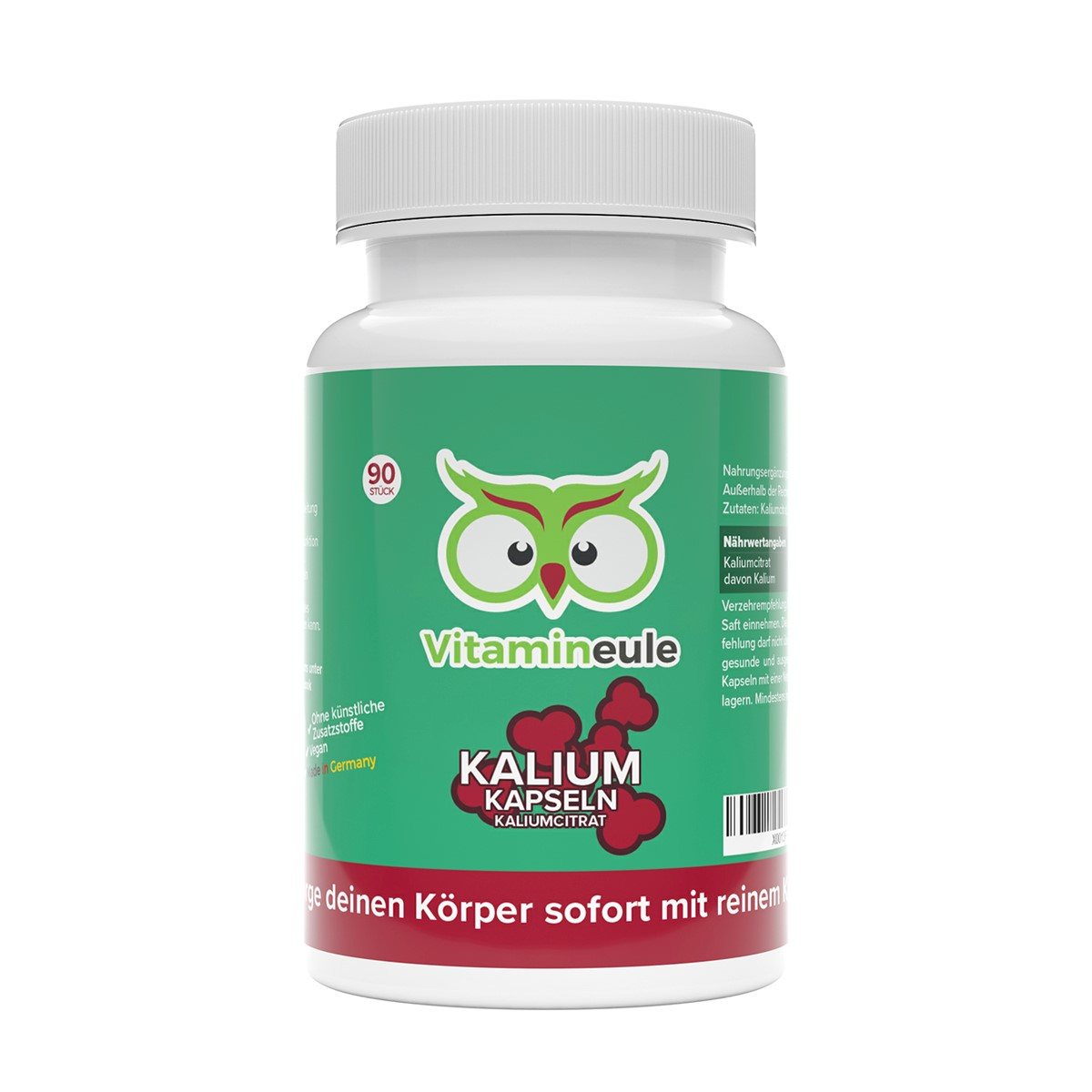
Team Vitamineule
Questions, wishes or suggestions? Just contact us by email or on Facebook.
1. what are the symptoms of potassium deficiency?
A deficiency of potassium is manifested by various symptoms. These include cardiac arrhythmias, reduced reflexes and muscle weakness. Often fatigue and constipation also occur. Due to the potassium deficiency, the heart muscle contracts more frequently and extrasystoles may occur.
How can I increase my potassium level?
Once your doctor has determined that your potassium level is too low, you should increase your potassium level by changing your diet or taking supplements. It is important to carry out a further test at the doctor's after the change in diet in order to detect possible changes in the potassium level at an early stage. The German Society for Nutrition (DGE) recommends a daily intake of about 4000 milligrams of potassium for an adult. Children up to 10 years of age need half the amount of an adult, i.e. the requirement is about 2000 milligrams. For breastfeeding women, the recommended amount of potassium is about 4400 milligrams, as they have to provide for their child through their mother's milk.
3) How can I cover my potassium requirement through food?
Potassium is an essential nutrient. Potassium is mainly found in unprocessed foods. Nuts, bananas and potatoes in particular contain large amounts of potassium. Products low in potassium are rice, fats, pasta and oils. Potassium content is reduced by cooking foods too hot.
Top 10 foods richest in potassium: (milligrams per 100 grams)
1. dried apricots approx. 1700
2. dried peaches approx. 1500
3. beans and lentils approx. 1100
4. tomato paste approx. 1000
5. dates approx. 800
6. pistachios approx. 800
7. pumpernickel approx. 500
8. potatoes approx. 410
9. Brussels sprouts, kale approx. 400
10. bananas approx. 400
4. potassium as a dietary supplement
If you want to increase a potassium level that is too low with a dietary supplement, you should definitely pay attention to the form of the active ingredient and its origin. Potassium capsules are particularly suitable for increasing potassium levels. They are very well tolerated and are utilized by the body to a high degree. The preparation should also not contain any chemical additives. If you buy a preparation from Germany, you can be sure that the product has also been produced safely and is of high quality.
Our recommendation:
Vitamineule® Potassium Capsules
In our online shop you will find our potassium capsules from Vitamineule®, which are completely free of artificial additives. Vitamineule® Potassium Capsules contain 200 mg of pure potassium citrate per capsule. Each can contains 90 capsules. In addition to fast & free shipping, we offer a voluntary six-month return guarantee on all products.
5. conclusion: What are the symptoms of potassium deficiency?
Potassium deficiency can cause symptoms and consequences such as heart disorders, nausea and vomiting. Changing your diet to include potassium-rich foods is usually a good way to correct a deficiency. Taking potassium in the form of supplements can additionally be very helpful in correcting and counteracting a deficiency.
Further sources:
- [Hyperspectral estimation of potassium content in apple florescence canopy based on fuzzy recognition]
-
Observations on the changes in plasma pH and potassium content and the effect of acupuncture on them in the rats with hemorrhagic shock].
-
Fouling of ultrafiltration membrane by algal-rich water: effect of potassium, calcium, and aluminum
-
Carbohydrate and potassium metabolism. III. Effect of glycogen contents of the liver and the muscles on the potassium metabolism].
-
Equipment-Free Detection of K + on Microfluidic Paper-Based Analytical Devices Based on Exhaustive Replacement with Ionic Dye in Ion-selective Capillary Sensors

